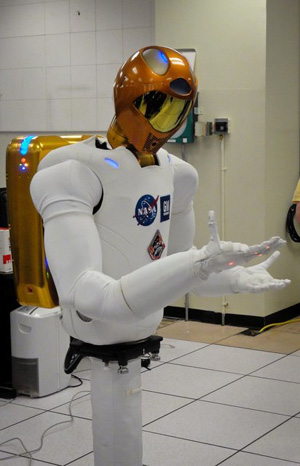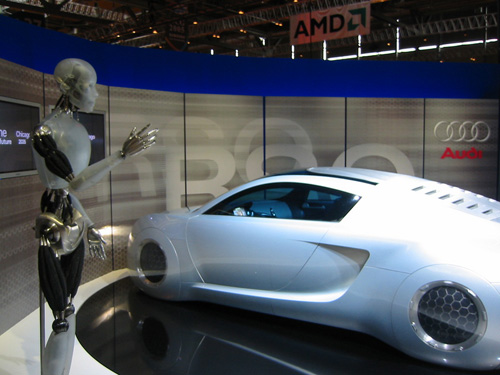This may be one of the most important articles you have read for preparing yourself and helping your nation prepare for the earth-changing technology shock coming in your lifetime.

‘We stand on the threshold of the most profound and transformative event in the history of humanity, the “Singularity” ‘, declared Ray Kurzweil, probably the savviest scientific visionary today.
The Singularity is the sooncoming era – expected to begin in the next 10 to 25 years, as estimated by scientists, when technological progress will happen so fast that the daily life of every man and woman on earth will be drastically and irreversibly altered in ways that the best of human minds can hardly even contemplate today.
There are leaders in many nations today who haven’t the faintest clue what awaits them and their nation in their lifetime. Their unpreparedness is actually making their nations at great risk of being left behind and at the mercy of those nations that foresaw the paradigm shifts about to overtake them and acted swiftly to cope with them.
Says Ray Kurzweil:
‘This merger of man and machine, coupled with the sudden explosion in machine intelligence and rapid innovation in the fields of gene research as well as nanotechnology, will result in a world where there is no distinction between the biological and the mechanical, or between physical and virtual reality. These technological revolutions will allow us to transcend our frail bodies with all their limitations. Illness, as we know it, will be eradicated. Through the use of nanotechnology, we will be able to manufacture almost any physical product upon demand, world hunger and poverty will be solved, and pollution will vanish. Human existence will undergo a quantum leap in evolution. We will be able to live as long as we choose. The coming into being of such a world is, in essence, the Singularity.’1
When is the Singularity expected to explode upon the world? It’s closer than most people in the world realize.
According to Kurzweil, by the mid to late 2020s, the effects of the nanotech and genetic revolution will be felt globally in every society. It will affect your life and mine drastically, if we are going to be around for another decade or so. It will radically transform the way we work, play and rest. At the end of the 2030s, artificial intelligence (AI) will exceed human intelligence – it means, in layman’s language, a robot will be more intelligent than even the brainiest human scientist in the world then. And when that happens, what’s the need for human beings in most of the workplaces and offices today?
The Singularity will be the single greatest work, lifestyle – and let me emphasize this – government system altering event since society began, far exceeding the impact of the industrial revolution, or the discovery of electricity, or the invention of the computer, or the institution of democracy.
Consider the implications of a society where AI is vastly superior to BI (brain intelligence).
Probably the immediate impact would be felt by both white- and blue-collar workers. Most of what they do now with their human brains and hands can be done much better by robots with intelligence and capabilities far exceeding those of humans. Present professional skills will become redundant. Society will have to discover new uses for human input.
Another area that will see amazing advances is the human body itself.
With the use of AI, medical science will be able to redesign and rebuild – molecule by molecule – our bodies and brains, so as to eliminate many diseases and increase the capacity of the human brain. But note this, scientists also admit that no matter how much we can improve human intelligence, BI will never reach a stage where it will be able to match the capability of AI. In the words of Hans Moravec of Carnegie Mellon University’s Robotics Institute, man will always be ‘second-class robots’. Let me remind you that we are talking of events that are expected to happen within one or two decades from now!
How prepared is your nation for this greatest event in the sociological, political and cultural history of the world?
Now, what is the reason that most government authorities are not as earnest as the AI technologists in anticipating the advent of the Singularity?
Since the beginning of history until this generation, our forbears expected life and society to remain much the same as it had always been, with just improvements to what had already been invented and discovered. Even the industrial revolution was a culmination of generations of innovative developments in mechanics. But the technological developments since the invention of the computer and the internet (with satellite tv also contributing in a major way) suddenly altered the way people had worked and lived for generations until then. Many nations were simply unprepared and neglected taking drastic steps to prepare for the historic changes that began to sweep society, the homes and the workplaces globally. I remember with sadness that in my own state the decisionmakers did not have the prescience to grasp the opportunities that came their way to make their state the leader in the nation’s IT revolution. When computers first made their tentative appearance in my state’s offices, they were violently resisted. A local newspaper, decades later, reported,
‘Reminiscing about how the first computer installed in the government sector a decade back was brutally smashed and broken by agitators who called it “an enemy of the unemployed youths”, the chief minister said these very computers are going to bring employment in the country.’
The opportunities that came first to my state eventually went to some other states and these states today are the locales of the globally renowned IT centers in this country.
Drastic change, for the common leader, is not easy to accept, if they think it is going to disrupt the way they have been working and thinking all the past years. When calculators first made their way into offices in my state in the 70s, there was a huge outcry among many political leaders that it would adversely affect the economy of the state as fewer human calculators would be needed to be employed as a result. But nobody could sweep away the avalanche of calculators falling onto the office desktops (desktops once used to mean the top of an office desk). Then came the conquest of the workplaces by the computers, then came satellite tv…and then on nobody wanted to watch the state-run dreary channels anymore. New innovative minds had to quickly replace ossified and job-secured government employees producing the same old programs for a helpless audience who had no choice of channels. The technological advance on various fronts was so forceful and global that no government could stop this juggernaut from rolling through the midst of their people and disrupting everything that had been remaining unshaken for generations and centuries.
I repeat the crucial question: What is the reason that most government authorities are not as earnest as the AI technologists in anticipating the advent of the Singularity? The answer can be nutshelled in one sentence: They, in the words of Ray Kurzweil, couldn’t understand the ‘quickening nature of technological innovation’. Or in other words, they continue to think of progress in the linear perspective and not in the exponential perspective.
Says Ray Kurzweil, ‘I emphasize the exponential-versus-linear perspective because it’s the most important failure that prognosticators make in considering future trends.’
This failure of perspective is the biggest reason why most government leaders in the past were caught unprepared for the massive paradigm shifts that happened as a result of the IT revolution, and why most government leaders today are not doing enough to prepare for the imminent incredible changes in both government functioning and societal requirements.
If you are a government decisionmaker, your refusal to transcend your linear perspective will prove in a few years time to be your biggest failure in preparing your citizens to successfully cope with the coming paradigm shifts in the way they work and live. If you are a corporate leader, this failure will mean that your business is swiftly headed in the direction of becoming a dinosaur within a decade or two.

Courtesy: Sarah Worthy – flickr.com
So what’s linear and exponential perspectives?
Until about the beginning of the 20th century, human progress since the first man took his first breath was anticipated and experienced at a slow and unnoticeable rate. Our ancestors expected the future to resemble what they had already experienced with some obvious advancements here and there. The bow and arrow, for example, that the first hunter (possibly Nimrod, the founder of Babylon) used wasn’t much different from what William the Conqueror’s archer used in downing King Harold II at the Battle of Hastings more than 5000 years later. Some paradigm shift occurred when gunpowder was discovered. Then again, progress continued from this new line. The balls fired from the cannons used in the battle of Gettysburg went a further distance than did the iron shots of George Washington’s time, but followed basically the same technology…until the cannonballs were replaced by shells. Artillery development took a new turn from that point.
The pace of linear development in the military sphere was also the pace of progress in all other areas of human endeavor. Until the 20th century.
Beginning around the turn of the 20th century, the rate of change saw a sudden acceleration. Technological expansion which had been had been linear until then – that is, expanding by additions of a constant, say, a machine capable of producing 10 units improves to 20, then to 30, 40 and so on – suddenly became exponential, that is, expanding by multiplication of a constant, 10 units becomes 100, then 10,000, then 1,00,000,000 units, in the same period of time that a linear expansion took to produce 40 units.
But so far the rate of the exponential change itself remained low; nevertheless high enough to turn many traders in my town to switch from using mainly the bullock-cart driven country roads to trafficking mainly on the global cyber highways in just about 30 years. Now what is happening is that the rate of exponential progress itself has become exponential.
The exponential growth that the 20th century saw in its 100 years was achievable in just 20 years at the rate of the exponential growth experienced in the year 2000! But that rate of change seen in 2000 has kept increasing, so much so that in just 14 years (by 2014) we would have achieved as much as the entire 20th century did. The exponential rate will keep increasing so that in just 7 years from 2014, that is, by 2021, technology will achieve as much as it achieved in the 100 years of the 20th century. To sum up, it is estimated that the 100 years of our present century will see the equivalent of 20,000 years of progress at today’s rate. But note carefully, it is 20,000 years at today’s rate. But today’s rate is also increasing exponentially, so the actual progress will be much, much more!
Because the common man, and government leaders in general, have not really grasped, not that the present progress is exponential, but that the rate of exponential progress itself is accelerating, they are going to be shaken to the core of their beings by what’s going to happen to their lives and their countries in the very near future. The social, cultural, political and technological scenarios that are coming in their very lifetimes will stun them all beyond belief.
Here are some of the scenarios, for your personal and professional preparation, based on the estimates of scientists such as Ray Kurzweil.
Beginning in about 10 years, society will be radically transformed by tremendous changes in three related areas of human endeavor – genetics, nanotechnology, and robotics. These transformation will usher in the Singularity.
By the year 2020, the genetic revolution will happen in full swing globally. Nanomedicine researchers predict that by then 50 percent of naturally occurring medical problems will be eliminated, and that will cause human life expectancy to jump within one generation to 150 years. When we able to prevent 90 percent of naturally occurring medical problems, we’d live to be more than 1,000 years old.
In the field of nanotechnology, even more amazing changes are predicted for the near future. With nanotechnology, scientists will be able to rebuild our physical world, including our bodies and brains, molecule by molecule, atom by atom. (estimated date, 2020s)
An exciting application of nanotechnology is in the administration of medication into the body to fight diseases. Nanoparticles, controlled wirelessly from outside the body, can navigate drugs inside the body and release them in specific locations where treatment is required. Once they reach the targeted areas, they will destroy pathogens, correct DNA errors, eliminate toxins, and perform many other tasks to eliminate disease and rectify damage. Man’s average lifespan, consequently, will increase dramatically to several centuries.
And now they are on the verge of being able to carry out cloning processes that can replace damaged and aging cells and organs. Got a damaged heart? No probs, just get it replaced with a brand new clone of it. Somebody lost a limb in an accident? Nothing to panic. He or she can have their hand or leg back as good as, or even better than the old one.
How long before this clone replacement becomes common practice in hospitals? The report is that they are ‘on the verge’. According to Kurzweil, ‘by the mid to late 2020s, the effects of the nanotech revolution will be wide spread and obvious’.
 The most earth-changing application of the nanotechnology, expected around 2030, will be the merger of human mind and machine intelligence, which will ‘greatly boost our pattern-recognition abilities, memories, and overall thinking capacity, as well as to directly interface with powerful forms of computer intelligence. The technology will also provide wireless communication from one brain to another’.
The most earth-changing application of the nanotechnology, expected around 2030, will be the merger of human mind and machine intelligence, which will ‘greatly boost our pattern-recognition abilities, memories, and overall thinking capacity, as well as to directly interface with powerful forms of computer intelligence. The technology will also provide wireless communication from one brain to another’.
Wireless communication from one brain to another? That’s telepathy! The age of being able to communicate with other human beings just by thinking is almost upon us! We are talking about events that will break upon the world in our lifetime – in the next 15 to 20 years!
Of all the technological revolutions that will mark the Singularity, it is Artificial Intelligence – robotics – that will rise to be the most life-impacting and world-changing event in modern man’s history.
By the end of this century, computer intelligence will be ‘trillions of trillions’ of times more powerful than biological brain capability. Robots will share knowledge and communicate with one another far more efficiently than can humans. Distinction between human and machine will become blurred, as more and more human functions are taken controlled by AI that will display human characteristics.
Entertainment and travel will enter a new dimension – all within the home itself. During the 2020s, our bodies will be able to experience ‘full-immersion virtual-reality environments’ – that is experience a simulated place or activity with all our senses. And, by the 2040s, it will not be a virtual experience; we will be able to do it in full reality. AI and nanotechnology can create any product, any situation, any environment that we can imagine at will!
What are the unknown implications of the awesome advancement in AI for governments and individuals? Already there are organizations that are working to prevent intelligent technology from overriding human control. One of them is the Foresight Institute, for technologists who agree to relinquish the development of machines that can self-replicate without the aid of humans and which can override outside influence.
‘As the Singularity approaches, we will have to reconsider our ideas about the nature of human life and redesign our human institutions. Intelligence on and around Earth will continue to expand exponentially until we reach the limits of matter and energy to support intelligent computation. As we approach this limit in our corner of the galaxy, the intelligence of our civilization will expand outward into the rest of the universe, quickly reaching the fastest speed possible. We understand that speed to be the speed of light, but there are suggestions that we may be able to circumvent this apparent limit (conceivably by taking shortcuts through ‘wormholes’, or hypothetical shortcuts through space and time.)’ Ray Kurzweil
Says scientist Damien Broderick:
‘We will live forever; or we will all perish most horribly; our minds will emigrate to cyberspace, and start the most ferocious overpopulation race ever seen on the planet; or our machines will transcend and take us with them, or leave us in some peaceful backwater where the meek shall inherit the Earth. Or something else, something far weirder and…unimaginable.’
Leaders in government must change their whole attitude about the future of their country. Unless they are constantly at the edge of awareness of what’s happening in technology, they will be like the leaders in many countries who were caught unprepared when the computer and telecommunications technology began to sweep through their countries.
For example, one such government kept on expanding their wired telephone services for the public until the cell phone revolution swept away all their landline policies to oblivion. In another sector, they worked to improve their programs on national telecast channels until, with the coming of satellite transmission, nobody in their right visual senses wanted to watch them anymore and preferred more interesting private channels. Then, belatedly, they began to adopt to the new paradigms in public service, but not before the public was lured away to the services overtaken by enterprising private business.
Typewriter manufacturers kept making ever more innovative typewriters. Makers of fountain pens, camera film rolls, mastercrafted Swiss chronometers, and other innumerable such presently almost obsolescent stuff kept on adding innovative feature upon feature to their products. Until the global explosion of a totally new invention in their industry suddenly smattered to smithereens all they had worked and lived for until then. Where’s Remington, whose typewriters were once the preferred choice in government and corporate offices, today? Where’s the once-ubiquitous Kodak today?
‘During most of the 20th century Kodak held a dominant position in photographic film, and in 1976 had a 90 percent market share of photographic film sales in the United States. The company’s ubiquity was such that its tagline ‘Kodak moment’ entered the common lexicon to describe a personal event that demanded to be recorded for posterity. Kodak began to struggle financially in the late 1990s as a result of the decline in sales of photographic film and its slowness in transitioning to digital photography, despite having invented the core technology used in current digital cameras. In January 2012, Kodak filed for Chapter 11 bankruptcy protection. In February 2012, Kodak announced that it would cease making digital cameras, pocket video cameras and digital picture frames. In August 2012, Kodak announced the intention to sell its photographic film, commercial scanners and kiosk operations as a measure to emerge from bankruptcy. Kodak sold many of its patents to a group of companies, including Apple, Google, Facebook, Amazon, Microsoft, Samsung, Adobe Systems and HTC.’ Wikipedia. Emphasis mine.
Sad. It’s not that they were unaware of what was coming. They were aware of the all emerging technologies that could obsolete their products, but never imagined that it would come so fast, that it would sweep away their world so suddenly and so thoroughly.
The most earth-changing application of the nanotechnology, expected around 2030, will be the merger of human mind and machine intelligence.
Not many governments are readying themselves sufficiently for the sooncoming paradigms in governance. But you, as a professional or a decisionmaker, can do many things to be fully prepared at the individual level.
The one global progress you should watch more alertly than any other development is Artificial Intelligence. This is the one technology that will soon radically change your personal life, your family life, your professional life, and everything else in your life.
Let me end this message with a true anecdote, one which I was a personal witness to.
Bjorn Borg was the greatest tennis player the world had seen in his time. Players then used only wooden rackets. There was no television in my land in those days for me to enjoy his matches, but I read in the newspapers with interest all I could about his matches. Then, in the prime of his glory, Borg decided to quit.
In the years following his retirement, the tennis equipment industry underwent a transformation. For the first 100 years of the modern game, rackets were of wood and of standard size, and strings were of animal gut. Then came rackets made of composites of carbon graphite, with synthetic strings that match the feel of gut yet with added durability. These modern materials enabled the production of rackets that yielded more power and dexterity. When Borg decided to reemerge as a professional player some years later, he came on court…with an wooden racket! All of Borg’s greater dexterity with the traditional racket was no match for the sheer power of the graphite rackets that all the other players used. Of course, Borg was speedily forced back into retirement after a few inglorious match.
I hope those mental factors that caused Borg to overlook the revolution transpiring in the tennis world will not cloud your alertness and that you will keep yourself in constant anticipation of awesome developments in Artificial Intelligence – developments that will change the fundamental way that every profession, every industry, and every government functions today. And I hope that you will do all in your power to influence decisionmakers in your nation’s government to ready your country for the greatest transformation in human history.
Pappa Joseph
1 ’Reinventing humanity: the future of human-machine intelligence’ – kurzweilai.net














